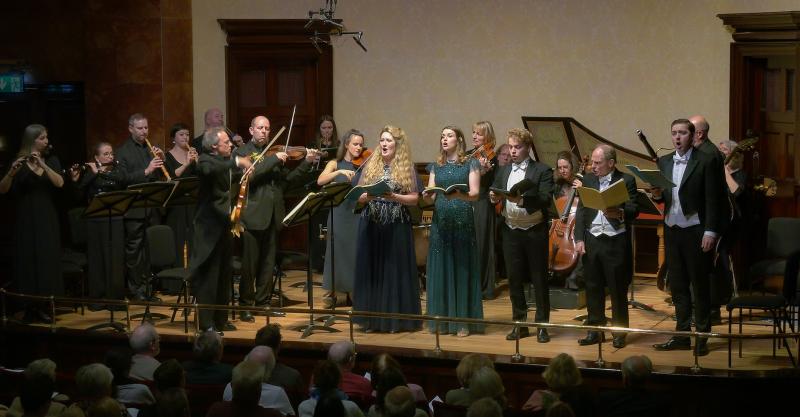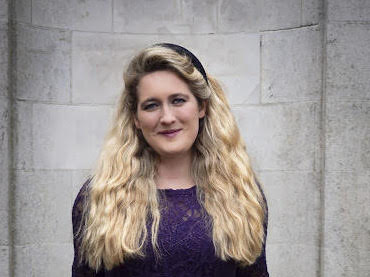London Handel Players, Butterfield, Wigmore Hall review - Bach with bite for Christmas | reviews, news & interviews
London Handel Players, Butterfield, Wigmore Hall review - Bach with bite for Christmas
London Handel Players, Butterfield, Wigmore Hall review - Bach with bite for Christmas
Cathedral-strength sound with an intimate touch

We think of the Wigmore Hall as a venue for intimate revelations, but in the right hands it can feel like a stadium. Last night’s all-Bach programme of festive music from the London Handel Players managed to embrace both moods.
On a bill that began with three Advent or Christmas cantatas and finished with a Magnificat that sounded, well, magnificent, characterful solo parts for singers and instrumentalists combined with blazing ensemble climaxes that gave the impression of a stage populated by far more than five voices and 15 players. The outfit led by violinist-director Adrian Butterfield featured plenty of Handel specialists, but this never felt like a coterie gathering. Butterfield’s forces wrapped us all in a powereful celebratory hug. We were, after all, marking the tercentenary of the Magnificat itself, composed for Bach’s first Leipzig Christmas in 1723.
At first the Advent cantata, Bereitet die Wege, bereitet die Bahn!, felt a touch hesitant, with voices and woodwinds not quite ideally balanced and a stuttering moment or two. Soprano Hilary Cronin (pictured below by Helena Cooke) soon settled into her stride, polished and secure, with savoury contributions from the lower strings (Sarah McMahon’s cello and Cecelia Bruggemeyer’s double bass) and the first of many finely-sung alto arias from counter-tenor Hugh Cutting. In “Süsser Tröst, mein Jesu kommt”, written for Christmas 1725, Jessica Cale’s smooth, rounded and expressive soprano delivery sweetly complemented ravishing flute and string parts in the opening lullaby.  The closing chorale gave a hint of the heft and lustre that this handful of singers could achieve, although the firmly grounded and nicely phrased recitatives from tenor (Charles Daniels) and bass (Jerome Knox) had helped prepare the way. In the following “Gloria in excelsis deo”, which Bach would later evolve into a section of the B minor Mass, the trumpet trio glinted and soared for the first time as this small-but-mighty choir blended punch and precision into a cathedral-strength sound. More splendid flute-playing, from Rachel Brown and Katy Bircher, added to the jubilation while Adrian Butterfield ensured that the whole caravan moved along with a magisterial tread, purposive but never frantic.
The closing chorale gave a hint of the heft and lustre that this handful of singers could achieve, although the firmly grounded and nicely phrased recitatives from tenor (Charles Daniels) and bass (Jerome Knox) had helped prepare the way. In the following “Gloria in excelsis deo”, which Bach would later evolve into a section of the B minor Mass, the trumpet trio glinted and soared for the first time as this small-but-mighty choir blended punch and precision into a cathedral-strength sound. More splendid flute-playing, from Rachel Brown and Katy Bircher, added to the jubilation while Adrian Butterfield ensured that the whole caravan moved along with a magisterial tread, purposive but never frantic.
After the interval, we enjoyed a Magnificat complete with the original so-called “Christmas interpolations” in German and Latin that concert performances normally omit. (However, Butterfield otherwise kept to the revised D major version of 1733). The interpolations add extra dramatic contrasts of light and shade to a score that already displays all Bach’s mastery of theatrical coups, surprises, and reversals – a showman’s flair equal to the shifts and twists of the Passions themselves. The “Magnificat” itself burst forth with seasonal lustre and swagger while Jessica Cale glowed with warmth and strength across her range in the “Ex exultavit”. Hilary Cronin’s “Quia respexit”, tenderly in dialogue with Joel Raymond’s oboe d’amore, was thrillingly ambushed by the sudden eruption of the chorus in “Omnes generationes”.
 But then the LHP relished so many of Bach’s idiosyncratic voice-instrument dialogues as well as his radiant choral proclamations – from the charming, near-comic chug and plod of Jerome Knox’s ”Quia fecit” to the delicate, ethereal flute-alto exchange that Hugh Cutting led in “Esurientes implevit bonis”. The words tell of the mighty cast down from their seats and the poor raised up to dignity – and, in a performance as nimble and idiomatic as this, Bach sounds pretty happy with it all. In “Fecit potentiam”, we really heard the proud being scattered in a breathtaking gear-change, while Charles Daniels tore incisively and pleasurably into the overthrow of the powerful in “Deposuit potentes” against some suitably angry, biting strings. Bach does, however, branch out into the occasional spell of pure inwardly-directed magic, as in the lovely trio “Suscepit Israel”, offered by Cronin, Cale and Cutting with a Mozartian grace and poise. And, if the “Sicut locutus est” spotlit the timbre and colour of the five individual voices as the canon unfolded, the final “Gloria patri” signed off in a proper Christmas starburst of vocal dazzle and trumpet glitter. Bach’s festive radiance sounded, as it should, generous and inclusive, but never soppy. His vision of peace comes with an irresistible cry for justice.
But then the LHP relished so many of Bach’s idiosyncratic voice-instrument dialogues as well as his radiant choral proclamations – from the charming, near-comic chug and plod of Jerome Knox’s ”Quia fecit” to the delicate, ethereal flute-alto exchange that Hugh Cutting led in “Esurientes implevit bonis”. The words tell of the mighty cast down from their seats and the poor raised up to dignity – and, in a performance as nimble and idiomatic as this, Bach sounds pretty happy with it all. In “Fecit potentiam”, we really heard the proud being scattered in a breathtaking gear-change, while Charles Daniels tore incisively and pleasurably into the overthrow of the powerful in “Deposuit potentes” against some suitably angry, biting strings. Bach does, however, branch out into the occasional spell of pure inwardly-directed magic, as in the lovely trio “Suscepit Israel”, offered by Cronin, Cale and Cutting with a Mozartian grace and poise. And, if the “Sicut locutus est” spotlit the timbre and colour of the five individual voices as the canon unfolded, the final “Gloria patri” signed off in a proper Christmas starburst of vocal dazzle and trumpet glitter. Bach’s festive radiance sounded, as it should, generous and inclusive, but never soppy. His vision of peace comes with an irresistible cry for justice.
rating
Explore topics
Share this article
Add comment
The future of Arts Journalism
You can stop theartsdesk.com closing!
We urgently need financing to survive. Our fundraising drive has thus far raised £49,000 but we need to reach £100,000 or we will be forced to close. Please contribute here: https://gofund.me/c3f6033d
And if you can forward this information to anyone who might assist, we’d be grateful.

Subscribe to theartsdesk.com
Thank you for continuing to read our work on theartsdesk.com. For unlimited access to every article in its entirety, including our archive of more than 15,000 pieces, we're asking for £5 per month or £40 per year. We feel it's a very good deal, and hope you do too.
To take a subscription now simply click here.
And if you're looking for that extra gift for a friend or family member, why not treat them to a theartsdesk.com gift subscription?
more Classical music
 Scottish Chamber Orchestra, Ibragimova, Queen’s Hall, Edinburgh review - rarities, novelties and drumrolls
A pity the SCO didn't pick a better showcase for a shining guest artist
Scottish Chamber Orchestra, Ibragimova, Queen’s Hall, Edinburgh review - rarities, novelties and drumrolls
A pity the SCO didn't pick a better showcase for a shining guest artist
 Kilsby, Parkes, Sinfonia of London, Wilson, Barbican review - string things zing and sing in expert hands
British masterpieces for strings plus other-worldly tenor and horn - and a muscular rarity
Kilsby, Parkes, Sinfonia of London, Wilson, Barbican review - string things zing and sing in expert hands
British masterpieces for strings plus other-worldly tenor and horn - and a muscular rarity
 From Historical to Hip-Hop, Classically Black Music Festival, Kings Place review - a cluster of impressive stars for the future
From quasi-Mozartian elegance to the gritty humour of a kitchen inspection
From Historical to Hip-Hop, Classically Black Music Festival, Kings Place review - a cluster of impressive stars for the future
From quasi-Mozartian elegance to the gritty humour of a kitchen inspection
 Shibe, LSO, Adès, Barbican review - gaudy and glorious new music alongside serene Sibelius
Adès’s passion makes persuasive case for the music he loves, both new and old
Shibe, LSO, Adès, Barbican review - gaudy and glorious new music alongside serene Sibelius
Adès’s passion makes persuasive case for the music he loves, both new and old
 Anja Mittermüller, Richard Fu, Wigmore Hall review - a glorious hall debut
The Austrian mezzo shines - at the age of 22
Anja Mittermüller, Richard Fu, Wigmore Hall review - a glorious hall debut
The Austrian mezzo shines - at the age of 22
 First Person: clarinettist Oliver Pashley on the new horizons of The Hermes Experiment's latest album
Compositions by members of this unusual quartet feature for the first time
First Person: clarinettist Oliver Pashley on the new horizons of The Hermes Experiment's latest album
Compositions by members of this unusual quartet feature for the first time
 Gesualdo Passione, Les Arts Florissants, Amala Dior Company, Barbican review - inspired collaboration excavates the music's humanity
At times it was like watching an anarchic religious procession
Gesualdo Passione, Les Arts Florissants, Amala Dior Company, Barbican review - inspired collaboration excavates the music's humanity
At times it was like watching an anarchic religious procession
 Classical CDs: Camels, concrete and cabaret
An influential American composer's 90th birthday box, plus British piano concertos and a father-and-son duo
Classical CDs: Camels, concrete and cabaret
An influential American composer's 90th birthday box, plus British piano concertos and a father-and-son duo
 Cockerham, Manchester Camerata, Sheen, Martin Harris Centre, Manchester review - re-enacting the dawn of modernism
Two UK premieres added to three miniatures from a seminal event of January 1914
Cockerham, Manchester Camerata, Sheen, Martin Harris Centre, Manchester review - re-enacting the dawn of modernism
Two UK premieres added to three miniatures from a seminal event of January 1914
 Kempf, Brno Philharmonic, Davies, Bridgewater Hall, Manchester review - European tradition meets American jazz
Bouncing Czechs enjoy their Gershwin and Brubeck alongside Janáček and Dvořák
Kempf, Brno Philharmonic, Davies, Bridgewater Hall, Manchester review - European tradition meets American jazz
Bouncing Czechs enjoy their Gershwin and Brubeck alongside Janáček and Dvořák
 Solomon, OAE, Butt, QEH review - daft Biblical whitewashing with great choruses
Even a top soprano and mezzo can’t make this Handel paean wholly convincing
Solomon, OAE, Butt, QEH review - daft Biblical whitewashing with great choruses
Even a top soprano and mezzo can’t make this Handel paean wholly convincing
 Two-Piano Gala, Kings Place review - shining constellations
London Piano Festival curators and illustrious friends entertain and enlighten
Two-Piano Gala, Kings Place review - shining constellations
London Piano Festival curators and illustrious friends entertain and enlighten

Comments
The shorter review is that is
The shorter review is that is was all pretty wonderful and the singers in particular seemed to be having tremendous fun. There was some serious talent on stage.
There were actually some
There were actually some rather hairy moments in the first half, and I found myself willing the performers to get through it.